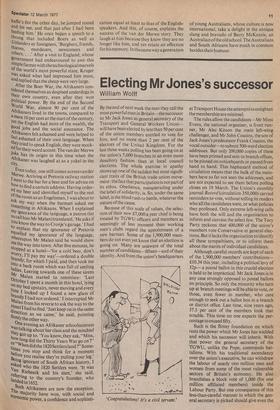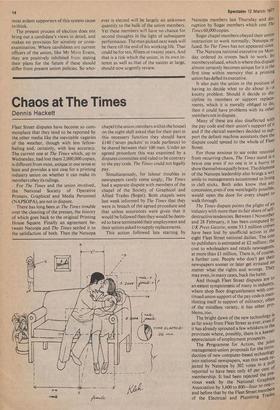Electing Mr Jones's successor
William Wolff
By the end of next week the man they call the most powerful man in Britain—the successor to Mr Jack Jones as general secretary of the Transport and General Workers Union— will have been elected by less than 50 per cent of the union members entitled to vote for him, and no more than 2 per cent of the electors of the United Kingdom. For the last three weeks polling has been going on at the union's 7,000 branches in an even more desultory fashion than at local council elections. The whole exercise in apathy shows up one of the saddest but most significant traits of the British trade union movement : the fact that participation is not part of its ethos. Obedience, masquerading under the label of solidarity, is. So, under the same label, is the blind rush to battle, whatever the nature of the cause.
Because of this scale of values, the selection of their new £7,000 a year chief is being treated by TGWU officers and members as seemingly of less moment than working men's clubs regard the appointment of a new barman. Some of the 1,900,000 members do not even yet know that an election is going on. Many are unaware of the total number of candidates—fifteen—and of their identity. And from the union's headquarters
at Transport House the attempts to enlighten the membership are minimal.
The rules allow the candidates—Mr Moss Evans, the national organiser, is front run ner, Mr Alec Kitson the main left-wing challenger, and Mr John Cousins, the son of Jack Jones's predecessor Frank Cousins, the vocal outsider—to submit 500-ward election addresses. But only 200,000 copies of these have been printed and sent to branch offices, to be pinned on noticeboards or passed from hand to hand. This haphazard method of circulation means that the bulk of the members have so far not seen the addresses, and are not expected to see them before polling
closes on 19 March. The Union's monthly journal Record (circulation 350,000) carried
reminders to vote, without telling its readers who all the candidates were, or what policies they professed. Only extreme left-wing cells have both the will and the organisation to inform and canvass the select few. The Tory Party reckons that 400,000 of the union's members vote Conservative at general elections. But it lacks the organisation to identify all these sympathisers, or to inform them about the merits of individual candidates.
Although careful records are kept of each of the 1,900,000 members' contributions— £10.34 this year, including a political levy of 32p— a postal ballot in this crucial election is held to be impractical. Mr Jack Jones is in any case strongly opposed to postal ballots on principle. So only the minority who turn up at branch meetings will be able to vote, or those, even fewer in number, who care enough to seek out a ballot box in a branch or district office. Last time, nine years ago, 37.3 per cent of the members took that trouble. This time no one expects the percentage to exceed fifty.
Such is the flimsy foundation on which rests the power which Mr Jones has wielded and which his successor will inherit. With that power the general secretary of the TGWU, unlike the Pope, commands battalions. With his traditional ascendancy over the union's executive, he can withdraw the labour of nearly two million men and women from some of the most vulnerable sectors of Britain's economy. He also • brandishes a block vote of 1,000 (for one million affiliated members) inside the Labour Party. But one consequence of this less-than-careful manner in which the general secretary is picked should give even the most ardent supporters of this system cause to think.
The present process of election does not bring out a candidate's views in detail, and makes no provision for scrutiny or crossexamination. Where candidates are current officers of the union, like Mr Moss Evans, they are positively inhibited from stating their plans for the future if these should differ from present union policies. So who ever is elected will be largely an unknown quantity to the bulk of the union members. Yet these members will have no chance for second thoughts in the light of subsequent performance. The man picked next week will be there till the end of his working life. That could be for ten, fifteen or twenty years. And that is a risk which the union; in its own interest as well as that of the nation at large, should now urgently review.







































 Previous page
Previous page